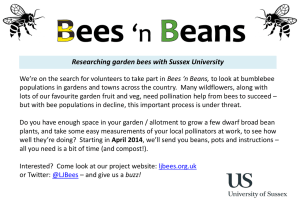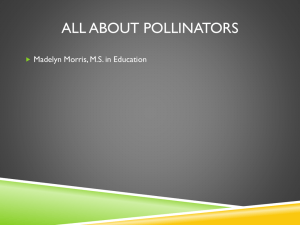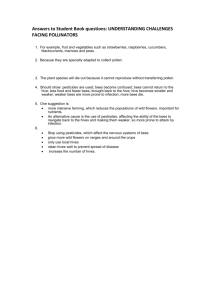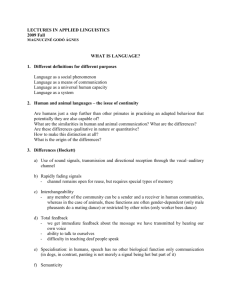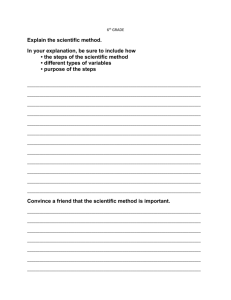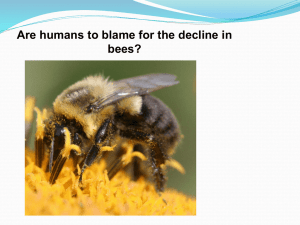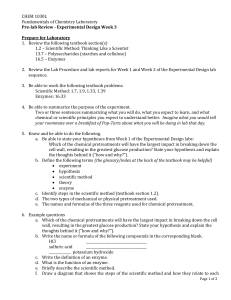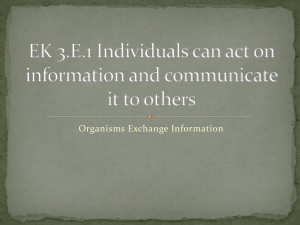Guidance for Northern Ireland bee importers Word
advertisement
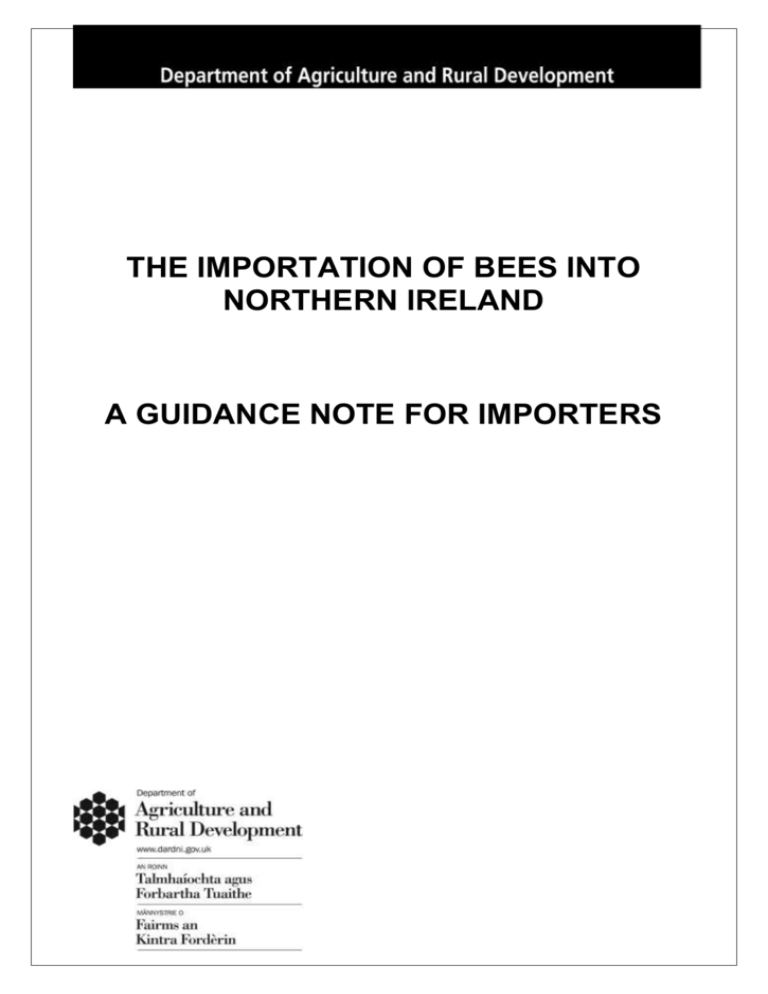
THE IMPORTATION OF BEES INTO NORTHERN IRELAND A GUIDANCE NOTE FOR IMPORTERS IMPORTANT NOTE This Note has been produced with the purpose of providing informal, non-statutory guidance that aims to clarify the animal health requirements that apply to imports of bees into Northern Ireland from within the European Community, third countries and Great Britain. It does not provide a comprehensive coverage of all conditions laid down in European Community and national legislation and has no legal force. Importers must satisfy themselves that all consignments of bees are imported in accordance with all the relevant legislative conditions and requirements. The authoritative legal position can be found in the appropriate national legislation which is available at http://www.opsi.gov.uk/stat.htm and for European Commission legislation at http://eur-lex.europa.EU/RECH_menu.do?ihmlang=en If you have any queries about the import requirements for bees, please contact: Department of Agriculture and Rural Development Quality Assurance Branch Room 1019 Dundonald House Upper Newtownards Road BELFAST BT4 3SB Tel: 028 9052 4168 Fax: 028 90524671 E-mail: qab.admin@dardni.gov.uk THE IMPORTATION OF BEES INTO NORTHERN IRELAND CONDITIONS FOR INTRA-COMMUNITY TRADE 1.1 Any person wishing to import bees into Northern Ireland from a member state of the European Community must comply with the Animals and Animal Products (Import and Export) Regulations (Northern Ireland) 2006. These Regulations implement the import conditions for bees of the species Apis mellifera (i.e. honey bees) and bumble bees that are contained in Article 8 of Council Directive 92/65/EEC, commonly known as the “Balai” Directive. This Directive covers the movement of animals (including bees) and other products of animal origin, which are not covered by other EC animal health legislation. 1.2 Importers must ensure that a consignment of bees: comes from an area that has been free from American foul brood disease for at least the previous 30 days. The competent authority in the Member State of origin must have checked all the hives within a 3 kilometre radius and if any have been found to be infected they must be burned or treated to the satisfaction of the competent authority. comes from an area of at least 100km radius which is not the subject of any restrictions associated with the suspicious or confirmed occurance of the small hive beetle (Aethina tumida) or the Tropilaelaps mite (Tropilaelaps spp )and where these infestations are absent. as well as their packaging, have undergone a visual examination to detect the occurance of the small hive beetle (Aethina tumida) their eggs or larvae or other infestations in particular Tropilaelaps spp. affecting bees. is accompanied by an original health certificate modelled on Annex E Part 2 of Council Directive 92/65/EEC (as amended by Commission Decision 2007/265/EC) issued by the relevant Member State authority. This certificate is valid for 10 days from the date of issue. 1.3 Further conditions apply as Northern Ireland is a Fireblight Protected Zone and movement of Bee packages and Hives into EU designated Fireblight Protected Zones between 15 March and 30 June is subject to control measures in the Plant Health Directive (2000/29/EC). The control measures in this directive are implemented by The Plant Health Order (Northern Ireland) 2006. Documentary evidence must show that: the bees originate in a country recognised as being free from fireblight; or originate in one of the EU Fireblight Protected Zones; or have undergone an appropriate quarantine measure restricting foraging activity for at least 48 hours prior to arrival. 1.4 Importers must give at least 24 hours notice in writing (including fax) to DARD’s Quality Assurance Branch which has responsibility for premises of destination situated in Northern Ireland, of their intention to import from other Member States, giving the expected date/time of arrival and place of destination. A notification form is available on the bee health pages of the DARD website at http://www.dardni.gov.uk/index/animal-health/bees.htm. CONDITIONS FOR THIRD COUNTRY TRADE IMPORT CONDITIONS 2.1 The Animals and Animal Products (Import and Export) Regulations (Northern Ireland) 2006 also implement the import conditions (as opposed to requirements that apply following importation) for bees that are contained in Commission Decision 2003/881/EC, as amended by Commission Decision 2005/60/EC which regulates the importation of bees to the European Community from third countries. 2.2 Commission Decision 2003/881/EC provides that: imports of bees are restricted to bees of the species Apis mellifera and Bombus spp. Import controls are applied to bumble bees (Bombus spp.) as it has been demonstrated (albeit under laboratory conditions) that the small hive beetle can parasitise bees of this species and could therefore be introduced through such imports. the bees can only be allowed into the Community from those third countries (or parts thereof) listed in Part 1 to Annex II to Council Decision 79/542/EEC (see list at Annex A attached) provided that the 3 notifiable diseases/pests of bees in the EU – American foul brood, Aethina tumida (small hive beetle) and Tropilaelaps spp. (tropilaelaps mites) – are also confirmed as notifiable diseases throughout the exporting country, or an exporting region of a third country specifically identified in Part 2 of Annex III to Commission Decision 2003/881/EC. We are only aware that Argentina, Australia, the US State of Hawaii (which has been given a special derogation by the EU) and New Zealand are able to meet the EU requirements. Should you wish to import bees from any of the other third countries listed in Annex A, you should check with DARD, or alternatively with the relevant authority in the third country concerned, that it is able to comply with the requirements of the EU health certificate. the bees must come from an area that is not affected by these notifiable diseases, and that they have been inspected and certified as being free of diseases, including notifiable diseases and infestations affecting bees. the bees must be accompanied by an original health certificate signed by the relevant authority in the country of origin. Copies are not permitted. Each health certificate must cover only one consignment and bear the full address of the consignment’s final destination. Health certificates are valid for 10 days from the date of issue. imports of bees from eligible third countries (except New Zealand) are restricted to consignments of queen bees and attendant workers only. Each queen bee must be contained in a single cage and accompanied by no more than 20 attendant worker bees. imports of packaged honey and bumble bees are only permitted from New Zealand as a derogation has been agreed under the EU/NZ Veterinary Agreement. Imported consignments must be accompanied by an original health certificate modelled on Annex VI of Commission Decision 2003/561/EC (as amended by Commission Decision 2006/855/EC) and signed by the relevant authorities in New Zealand. packages or single colonies of bumble bees (a maximum of 200 adult bees per container) are permitted from eligible third countries provided that they are bred under environmentally controlled conditions within recognised establishments. Each consignment must be accompanied by an original health certificate modelled on Annex II to Commission Decision 2003/881/EC. BORDER INSPECTION POSTS 2.3 It is a requirement of the Animals and Animal Products (Import and Export) Regulations (Northern Ireland) 2006 that all bees imported directly into Northern Ireland from a third country must enter through an approved Border Inspection Posts (BIPs). In order to comply with the requirement for documentary checks, we strongly recommend that bees be sent cargo, as opposed to airmail as, this will ensure that the bees are given special treatment as live animal cargo. At the UK BIPs, DEFRA officials will issue a Border Crossing Certificate and forward the bees to their destination. There are no BIP’s with approval for importing bees directly into Northern Ireland so imports must arrive at either of the BIP’s listed at 2.6 or see note 2.4 2.4 Presently there are no provisions for importation of live bees from third countries into any Republic of Ireland ports. Before considering this option importers should contact the relevant authorities regarding the present handling facilities and status of the BIP’s at ports in ROI. For further information regarding importation into or through the Republic of Ireland contact: Department of Agriculture, Fisheries & Food Backweston Campus Stacumney Lane Celbridge Co. Kildare. Tel: 00 353 1 5053442. Attention is also drawn to the fact that registration and notification requirements must also be complied with for importation to the Republic of Ireland as well as notification to DARD for movements to Northern Ireland from the Republic of Ireland. 2.5 Importers must give, by post or fax, at least one clear working day's notice, in writing, of the anticipated date of arrival of the consignment to the Divisional Veterinary Manager of the BIP through which the consignment is to be imported. A notification form is available at http://www.fera.defra.gov.uk/plants/forms/documents/plantHealth/DEF-BEE28FERA.pdf Notifications should be sent Thursday for a consignment arriving on a Saturday, Sunday or Monday; Friday for a consignment arriving on Tuesday; Monday for arrivals on Wednesday and so on. Advance notice is required so that the necessary documentary checks can be made. Ideally, notification should be done via the TRACES system and should include all the information required by Part 1 of the Common Veterinary Entry Document (CVED) (Commission Regulation (EC) No. 282/2004 refers). Further information is available at http://www.defra.gov.uk/animalh/int-trde/traces/index.htm 2.6 All notification forms to be sent to one of the following the BIPs: 3.1.1 Heathrow BIP Divisional Veterinary Manager Animal Reception Centre Beacon Road Heathrow Airport Hounslow Middlesex TW6 3JF Tel: 020 8759 7002 Fax: 020 8564 8939 3.1.2 Gatwick BIP Divisional Veterinary Manager Animal Health Division Liberty House 105 Bell Street Reigate RH2 7JB Tel: 01737 242242 Fax: 01737 241189 and copied to: Department of Agriculture & Rural Development Quality Assurance Branch Room 1019 Dundanald House Upper Newtownards Road BELFAST BT4 3SB Tel: 028 9052 4168 Fax: 028 90524671 Email: qab.admin@dardni.gov.uk 2.7 Please note that non-compliance with the import requirements in the Animals and Animal Products (Import and Export) Regulations (Northern Ireland) 2006 is an offence and could lead to prosecution. CHARGES FOR VETERINARY CHECKS 2.8 Importers should note that under the provisions of the Animals (Third Country Imports) (Charges) Regulations 1997, charges are made for veterinary checks on animals, including bees entering the UK from a third country. Importers are asked to send their fee, currently set at £5.00 per consignment, to the Divisional Veterinary Manager of the BIP when returning their notification form. This fee may be subject to review in the future. POST IMPORT CONTROLS 2.9 EC requirements for post import controls on consignments of bees imported from third countries are contained in Commission Decision 2003/881/EC (as amended). They are aimed at reducing the risk of introduction and spread of exotic bee pests, in particular the small hive beetle and tropilaelaps mites, both of which are notifiable. These post controls are implemented in Northern Ireland by Article 11 of The Bee Diseases and Pests Control Order (Northern Ireland) 2007. This article requires that: Once the imported queen bees arrive at the apiary of destination, the consignee/importer transfers the queens to new (queen) cages before they are introduced to any local colonies. The consignee/importer sends the (queen) cages, attendant worker bees and other material that accompanied the queen bees from their third country of origin to a laboratory for examination for the presence of the small hive beetle and tropilaelaps mite. For queen bees imported into Northern Ireland, all such items should be sent to the Agri-Food & Biosciences Institute (AFBI) Zoology & Entomology, Newforge Lane, BELFAST BT9 5PX within 5 days of importation. Where colonies of bumble bees have been imported, the importer must destroy the container in which they were transported and all material that accompanied the bees either during or immediately at the end of the lifespan of the imported colony. 2.10 Please note that non-compliance with the post-import requirements in The Bee Diseases and Pests Control Order (Northern Ireland) 2007 is an offence under the Bees (Northern Ireland) Order 1980 and could lead to prosecution. PACKING PRECAUTIONS 2.11 When packing bees and other materials for posting to AFBI, please do not use tin boxes, polythene bags or other airtight containers. The 'sweating' of a sample thus enclosed leads to rapid decomposition of the bees and makes an examination difficult. Please use matchboxes or small cardboard containers, as bees travel well in such containers and arrive in good condition for examination. CONDITIONS FOR GB TRADE 3.1 Northern Ireland is a Fireblight Protected Zone and movement of Bee packages and Hives into EU designated Fireblight Protected Zones between 15 March and 30 June is subject to control measures in the Plant Health Directive (2000/29/EC). The control measures in this directive are implemented by The Plant Health Order (Northern Ireland) 2006. 3.2 Documentary evidence must show that the bees moved from GB have undergone an appropriate quarantine measure restricting foraging activity for at least 48 hours prior to arrival. Quality Assurance Branch February 2010 ANNEX A IMPORTATION OF QUEEN HONEY BEES FROM THIRD COUNTRIES: THIRD COUNTRIES LISTED IN PART 1 OF ANNEX II TO COUNCIL DECISION 79/542/EEC (AS AMENDED) FROM WHICH IMPORTS OF BEES MAY BE ALLOWED INTO THE EUROPEAN COMMUNITY FROM 2008 Albania Algeria Argentina Australia Bahrain Belarus Belize Bosnia-Herzegovina Botswana Brazil Bulgaria Canada Chile China, People’s Republic of Colombia Costa Rica Croatia Cuba Cyprus ** El Salvador Ethiopia Falkland Islands Greenland Guatemala Hong Kong Honduras Iceland India Israel Kenya Macedonia, Former Yugoslav Republic of Madagascar Mauritius Mexico Morocco Namibia New Caledonia New Zealand Nicaragua Panama Paraguay Romania Russian Federation Serbia and Montenegro South Africa Swaziland Switzerland Thailand Tunisia Turkey Ukraine United States of America# Uruguay Zimbabwe ** northern Cyprus remains a third country for import purposes. # Derogation allowing imports from the State of Hawaii only. Imports into the European Community from mainland USA are prohibited.
